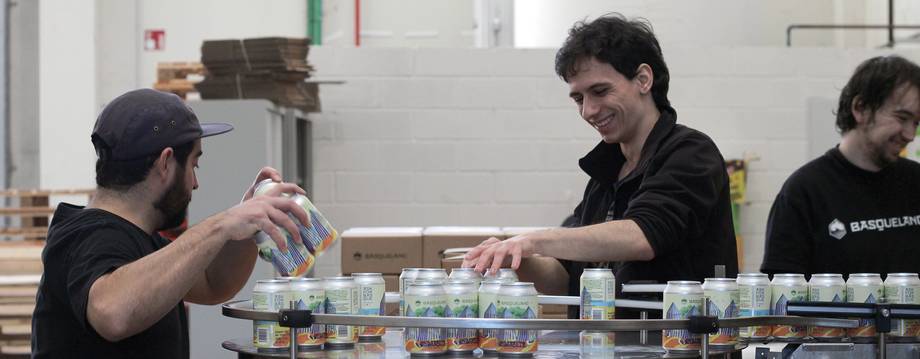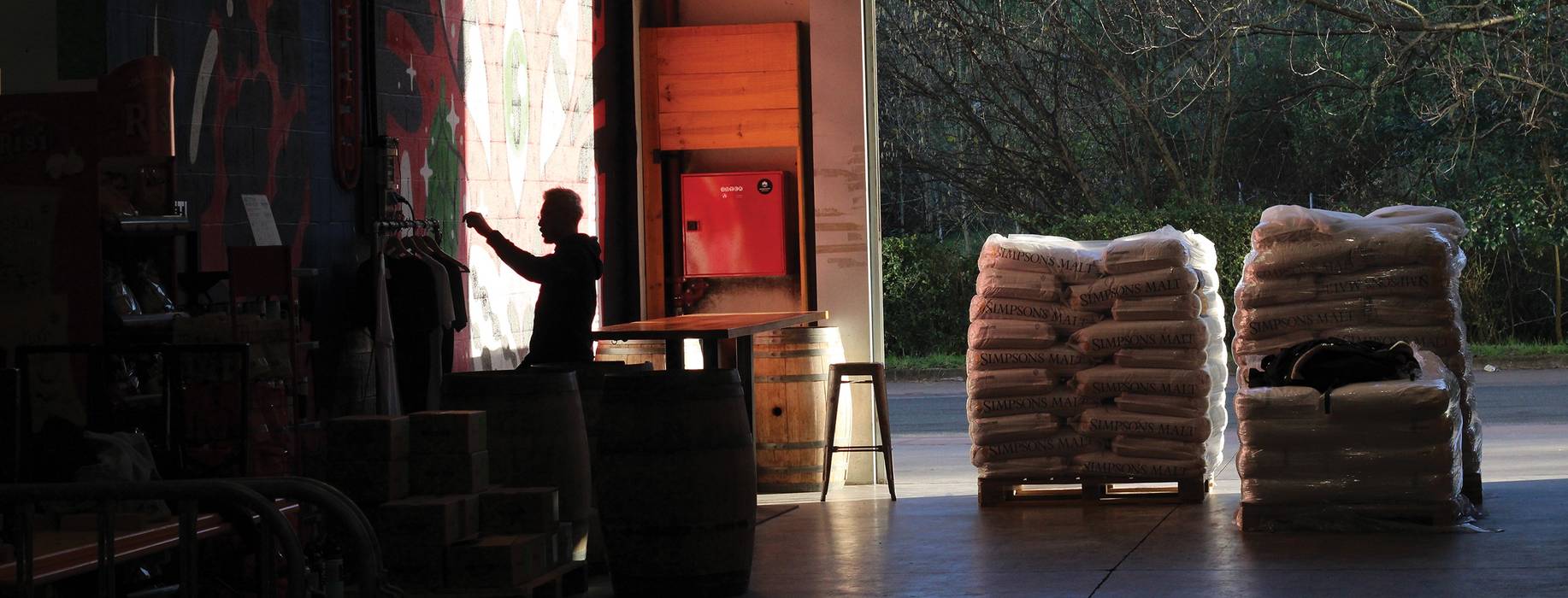Basqueland
Think beer on par with Basque cuisine
Robyn Gilmour
Photos:
Robyn Gilmour

This article is from
Spain
issue 88
Share this article
You wouldn’t know, from first meeting the warm, hospitable and smartly dressed Kevin Patricio, that the now CEO of Basqueland Brewing spent several years cooking in some of Manhattan’s finest eateries. Give him 15 minutes though, and the tenacity of his epicurean spirit is sure to leave you with suspicions. I suspect, however, that Kevin’s move to the Basque Country 11 years ago has more to do with the person whose car I jump into on a mild and clear day in January, than Manhattan does.
We do greetings and introductions as we crawl through San Sebastian. The city is frantically finalising preparations for Dia de los Reyes. There are kids and parents everywhere, and many of the city’s streets are cordoned off for the parade scheduled for that evening. We struggle to find parking near the pintxos bar we head to.
As we circle, Kevin tells me that he’d never worked in beer before 2014, and neither had his business partner, Benjamin Rozzi. The two Americans met in San Sebastian and became friends by watching football together, and lamenting the state of beer in Spain.
“I was working as a chef at that time, and he was working in a local winery,” says Kevin. “One day, I was just like ‘man, we have great food here at the restaurant, we can source great wine, make great cocktails, but can only offer really shitty beer’. There was really nothing local at this time and everything imported came through a reseller. So it wasn’t very fresh.”
The idea of making beer of their own occurred to both parties simultaneously; Kevin was keen to complete the experience of his customers, and Ben, being from San Diego, was gunning to go the whole hog and start a brewery, period. “This all distilled into an ambition to make a beer on par with the Basque culinary experience,” Kevin says, which, coming from a dedicated ex-chef and Food & Wine Magazine alumnus, is just as high flying as it sounds.

We finally find parking, and walk a couple of minutes to La Espiga, where the bar and pintxos-lined countertop is tended by older men pouring 150ml servings of cider from a height. The din of enthusiastic diners is astounding, and the ground littered with crumpled paper napkins. Kevin tells me that the rule of thumb in San Sebastian is that used napkins are thrown on the floor to keep the counter top clean for diners you eat shoulder-to-shoulder with. We order classic Gilda, Callos y Morros, Kokotxas, and the house-speciality las delicias (a piece of crusty baguette topped with cured anchovy, aioli, sliced hard boiled egg and marinated onion. The sum greater than its parts).
Between mouthfuls of tripe, anchovies, olives and pickled green peppers, Kevin says that for the first three batches that the embryonic Basqueland produced, Ben and Kevin convinced a local brewery to lend them some space on a kit, and flew over an old connection of Ben’s from the States to do the brewing. Ben Matz was a senior brewer at Stone at the time, and had previously brewed at Pizza Port. The idea was that with his expertise and oversight, Basqueland would make a knock-out batch the first time around, and see how it was received.
“At first people didn’t get it. The flavours. The hops. Even the freshness. I think it was overwhelming for them to have something that wasn’t a standard lager”, says Kevin. “But we were able to convince some friends in the hospitality industry to give it a try. Initially, people would buy a case, mostly out of charity, but that all changed over the course of what felt like a single week, when they started to sell out and customers came back with increasingly positive feedback.
“Obviously we were confident with the quality of the product. We could get this beer into marquee restaurants, the best pintxos bars, you know everything from a Michelin star to a biker bar. It was natural for us to want to be in the best places, and we had faith that by aligning the beer with top quality food, people with similar interests would strive to do the same.”
The first batch paid for the production cost and Ben Matz’s flight from San Diego, as did the second, though this middle batch was also used to recruit investors. “We were fully subscribed within a month”, says Kevin. “The beer was good. The idea was good, and seemingly, the time was right. We weren't the first people in Spain doing this. Naparbier and DouGalls, for example, had been making some really good beer for years already.

“They were the first through the door really, and being the first to navigate the nascent Spanish market was a huge challenge. When Naparbier were just getting started, much of their market was export. Through their efforts locals began to take notice and the Spanish craft scene took off.”
With investment secured, Ben and Kevin purchased everything needed to set up a brewery of their own, found a location, did an installation, and Basqueland was serving its own beer by September 2015; about two years after starting out, and having only released three batches of beers before. As of this year, Basqueland is the biggest independent craft brewery in Spain, though this is not to say that the brewery is huge.
Basqueland produced 7000 hectolitres this past year, 70% of which stays in Spain, with the majority of that being distributed and consumed in the Basque Country. “Local in the craft scene is where you need to be,” says Kevin, acknowledging that operating like that is and has traditionally been incredibly difficult in a Spanish market where, statistically, 99% of consumers are still comfortable in the clutches of industrial beer. “The closer to home the fresher the beer, the better the service and, you know, looking at the US and UK, craft always wants to become hyperlocal at some point.”
This brings us to an interesting point. “We’re 20 minutes from the French border,” says Kevin, “that is to say, the Pays Basque. B-A-S-Q-U-E. Here we’re the Pais Vasco. V-A-S-C-O. Because we spelled ‘Basqueland’ the way we did, some Spanish people who look at our brand don’t immediately identify it as domestic, which was, in some ways, intentional–demonstrating provenance without being political.” This refers to the now resolved but decades old friction between the Spanish government and the Basques.
We pay up and ship out, wandering back to the car so we can head out of town to the brewery. It’s clear and mild, and the sky is a shocking blue against brown leaves still clinging to their trees, and the ornate, golden architecture of narrow streets. I’m not sure that Kevin or any of the Basqueland team would see it this way, but it strikes me as both wonderful and painful that Basqueland, a brewery that is so profoundly and passionately a product of its locality, had to balance its brand with political tensions of the past.

Basqueland is obviously now an incredible international success, selling to a plethora of thirsty markets and collaborating with the best that the global craft beer industry has to offer. Yet for all that, I am amazed at just how hard-fought progress is in Spain itself, and not just by Kevin and the team, but every brewery I speak to for this issue. Being from the States, Kevin is not as phased by the bureaucracy that comes with running a small brewery as many others, but that doesn’t undo how blatantly skewed licensing is in favour of industrial beer producers.
It’s easy to sell beer in Spain, but the process of producing it is very highly regulated, so much so that breweries often need a trained and dedicated professional to manage the paperwork. Every batch requires its own extensive report, both as proof of compliance with hygiene regulations, and to account for the (often significant) volume of product lost to dry hopping, which authorities initially seemed to assume was a share being skimmed off the top and sold tax-free.
This per-batch reporting is obviously much more laborious for breweries with a 20 or 30 hectolitre brewhouse, than it is for industrial producers pumping out 100-plus hectolitres in each batch.
Yet for all the heartache and hard graft, Basqueland’s brewery greets us with a shock of bright colour. In spite of being deep in the gruelling task of canning, labelling and packing the Beer52 order when I arrive, the team I meet is among the most welcoming, playful and fun-loving I have encountered. Everyone is from everywhere, and has worked in breweries all over. The team stop and chat while rolling cigarettes, are as quick-witted with Kevin as he is with them, and all have opinions on everything from automated vs manual brew kits to canning lines to nightlife in San Sebastian.
That kind of conversation and debate is not common everywhere, and it occurs to me as everyone very graciously pauses labelling, lab testing and recipe designing, to squeeze into a photograph for me, that Basqueland might be bringing more than beer to the craft landscape in Spain.
Share this article

